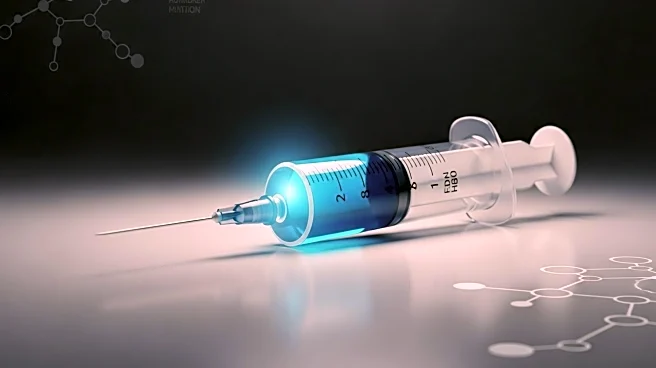What is the story about?
What's Happening?
Researchers at Science Tokyo have developed an mRNA vaccine that shows promise in treating age-related macular degeneration (AMD), a leading cause of vision loss among the elderly. The vaccine, which can be administered intramuscularly, has demonstrated effectiveness in suppressing abnormal blood vessel growth in the retina of mouse models. This condition, known as neovascularization, is a hallmark of wet AMD, where abnormal vessels leak fluid into the retina, leading to vision loss. Current treatments require frequent eye injections of anti-angiogenic drugs, which can be burdensome for patients. The new mRNA vaccine encodes leucine-rich alpha-2-glycoprotein 1 (LRG1), a protein that promotes angiogenesis, and stimulates the body to produce antibodies that inhibit LRG1. The vaccine has shown comparable effectiveness to existing therapies, offering a less invasive alternative with potential long-term benefits.
Why It's Important?
The development of this mRNA vaccine is significant as it could revolutionize the treatment of AMD by reducing the need for frequent and uncomfortable eye injections. This advancement could improve the quality of life for millions of patients suffering from AMD, particularly the elderly, by providing a simpler and more comfortable treatment option. The vaccine's ability to offer long-term benefits with a single dose could also reduce healthcare costs and the treatment burden on patients. Furthermore, the success of this vaccine in animal models highlights the potential of mRNA technology to address chronic conditions beyond infectious diseases, expanding its application in medical treatments.
What's Next?
If proven effective in human trials, this mRNA vaccine could replace current AMD treatments, offering a more convenient and less invasive option for patients. The research team, led by Professor Satoshi Uchida and Visiting Professor Yasuo Yanagi, plans to further investigate the vaccine's efficacy and safety in human subjects. Successful human trials could lead to regulatory approval and widespread adoption of the vaccine, transforming the standard of care for AMD and potentially other neovascular eye diseases.
Beyond the Headlines
The use of mRNA technology in treating chronic conditions like AMD represents a significant shift in medical research and treatment strategies. This approach could pave the way for new therapies targeting other diseases characterized by abnormal angiogenesis. Additionally, the vaccine's development underscores the versatility of mRNA technology, which gained prominence during the COVID-19 pandemic, and its potential to address a broader range of health issues.















